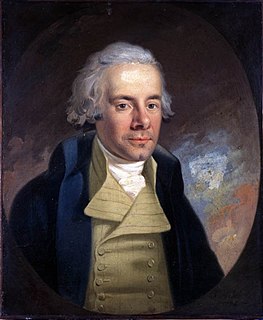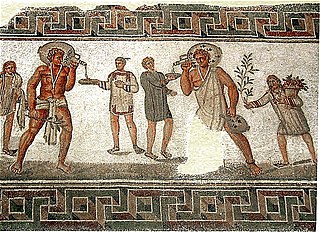
William Wilberforce was a British politician, philanthropist and leader of the movement to abolish the slave trade. A native of Kingston upon Hull, Yorkshire, he began his political career in 1780, eventually becoming an independent Member of Parliament (MP) for Yorkshire (1784–1812). In 1785, he became an evangelical Christian, which resulted in major changes to his lifestyle and a lifelong concern for reform.

Lucius Annaeus Seneca the Younger, usually known as Seneca, was a Roman Stoic philosopher, statesman, dramatist, and, in one work, satirist, from the post-Augustan age of Latin literature.

Posidonius "of Apameia" or "of Rhodes", was a Greek politician, astronomer, astrologer, geographer, historian, mathematician, and teacher native to Apamea, Syria. He was considered the most learned man of his time and, possibly, of the entire Stoic school. After a period learning Stoic philosophy from Panaetius in Athens, he spent many years in travel and scientific researches in Spain, Africa, Italy, Gaul, Liguria, Sicily and on the eastern shores of the Adriatic. He settled as a teacher at Rhodes where his fame attracted numerous scholars. Next to Panaetius he did most, by writings and personal lectures, to spread Stoicism to the Roman world, and he became well known to many leading men, including Pompey and Cicero.

The Slave Trade Act 1807, officially An Act for the Abolition of the Slave Trade, was an Act of the Parliament of the United Kingdom prohibiting the slave trade in the British Empire. Although it did not abolish the practice of slavery, it did encourage British action to press other nation states to abolish their own slave trades.
The Slavery Abolition Act 1833 provided for the immediate abolition of slavery in most parts of the British Empire. This Act of the Parliament of the United Kingdom was passed by Earl Grey's reforming administration and expanded the jurisdiction of the Slave Trade Act 1807 and made the purchase or ownership of slaves illegal within the British Empire, with the exception of "the Territories in the Possession of the East India Company", Ceylon, and Saint Helena. The Act was repealed in 1997 as a part of wider rationalisation of English statute law; however, later anti-slavery legislation remains in force.

The West Africa Squadron, also known as the Preventative Squadron, was a squadron of the British Royal Navy whose goal was to suppress the Atlantic slave trade by patrolling the coast of West Africa. Formed in 1808 after the British Parliament passed the Slave Trade Act 1807 and based out of Portsmouth, England, it remained an independent command until 1856 and then again 1866 to 1867.

Slavery in ancient Rome played an important role in society and the economy. Besides manual labour, slaves performed many domestic services and might be employed at highly skilled jobs and professions. Accountants and physicians were often slaves. Slaves of Greek origin in particular might be highly educated. Unskilled slaves, or those sentenced to slavery as punishment, worked on farms, in mines, and at mills.

The Society for Effecting the Abolition of the Slave Trade, also known as the Society for the Abolition of the Slave Trade, and sometimes referred to as the Abolition Society or Anti-Slavery Society, was a British abolitionist group formed on 22 May 1787.
Neostoicism was a philosophical movement that arose in the late 16th century from the works of Justus Lipsius, that sought to combine the beliefs of Stoicism and Christianity. Lipsius was Flemish and a Renaissance humanist. The movement took on the nature of religious syncretism, although modern scholarship does not consider that it resulted in a successful synthesis. The name "neostoicism" is attributed to two Roman Catholic authors, Léontine Zanta and Julien-Eymard d'Angers.

Proslavery is an ideology that perceives slavery as a positive good or an otherwise morally acceptable institution, something to be extended further, rather than abolished.

Slavery has historically been widespread in Africa. Systems of servitude and slavery were common in parts of Africa in ancient times, as they were in much of the rest of the ancient world. When the trans-Saharan slave trade, Indian Ocean slave trade and Atlantic slave trade began, many of the pre-existing local African slave systems began supplying captives for slave markets outside Africa. Slavery in contemporary Africa is still practised despite it being illegal.
In Stoic philosophy, pneuma is the concept of the "breath of life," a mixture of the elements air and fire. Originating among Greek medical writers who locate human vitality in the breath, and the pre-Socratic philosophy of Heraclitus that identified fire as the Arche or original element, pneuma for the Stoics is the active, generative principle that organizes both the individual and the cosmos. In its highest form, the pneuma constitutes the human soul (psychê), which is a fragment of the pneuma that is the soul of God. As a force that structures matter, it exists even in inanimate objects.

Stoicism is a school of Hellenistic philosophy founded by Zeno of Citium in Athens in the early 3rd century BC. It is a philosophy of personal eudaemonic virtue ethics informed by its system of logic and its views on the natural world, asserting that the practice of virtue is both necessary and sufficient to achieve eudaimonia—flourishing by means of living an ethical life. The Stoics identified the path to eudaimonia with a life spent practicing the cardinal virtues and living in accordance with nature.

The African Institution was founded in 1807 after British abolitionists succeeded in ending the slave trade based in the United Kingdom. The Institution was formed to succeed where the former Sierra Leone Company had failed—to create a viable, civilised refuge for freed slaves in Sierra Leone, in West Africa. It was led by James Stephen and William Wilberforce. From 1823, its work was mostly taken over by the Society for the Mitigation and Gradual Abolition of Slavery Throughout the British Dominions, and it ceased to exist sometime between 1826 and 1828.
Igbo people in Jamaica were shipped by Europeans onto the island between the 18th and 19th centuries as enslaved labour on plantations. Igbo people constituted a large portion of the African population enslaved people in Jamaica. Jamaica received the largest amount of slaves from the biafra region than anywhere else in the diaspora during the slave trade. Some slave censuses detailed the large number of enslaved Igbo people on various plantations throughout the island on different dates throughout the 18th century. Their presence was a large part in forming Jamaican culture, Igbo cultural influence remains in language, dance, music, folklore, cuisine, religion and mannerisms. In Jamaica the Igbo were often referred to as Eboe or Ibo. There are a substantial number of Igbo language loanwords in Jamaican Patois. Igbo people mostly populated the northwestern section of the island.
Stoic logic is the system of propositional logic developed by the Stoic philosophers in ancient Greece.

Abolitionism in the United Kingdom was the movement in the late 18th and early 19th centuries to end the practice of slavery, whether formal or informal, in the United Kingdom, the British Empire and the world, including ending the Atlantic slave trade. It was part of a wider abolitionism movement in Western Europe and the Americas.
Although many Enlightenment philosophers opposed slavery, it was Christian activists, attracted by strong religious elements, who initiated and organized an abolitionist movement. Throughout Europe and the United States, Christians, usually from "un-institutional" Christian faith movements, not directly connected with traditional state churches, or "non-conformist" believers within established churches, were to be found at the forefront of the abolitionist movements.

De Ira is a Latin work by Seneca. The work defines and explains anger within the context of Stoic philosophy, and offers therapeutic advice on how to prevent and control anger.
Contemporary Stoicism refers to currents in culture from the 20th century and later reviving elements of Stoicism. It is different from neostoicism, an earlier revival in the 17th century. The term "contemporary Stoicism" covers both the revival of interest in Stoic philosophy and the philosophical efforts to adjust ancient Stoicism to the language and conceptual framework of the present.











